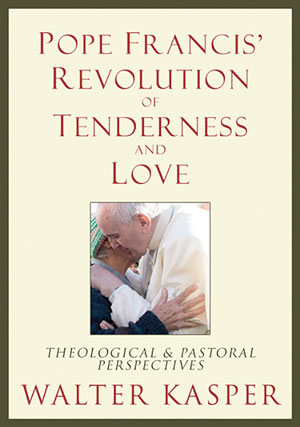Sixth in a series
AS I have been reporting in several columns in this series on Pope Francis’ vision for the Church, I have found a marvelous guide in Cardinal Walter Kasper’s “Pope Francis’ Revolution of Tenderness and Love” (New York: Paulist Press, 2015, pp. 117, $16.95). I cannot recall any book the length of Cardinal Kasper’s that is so full of both information and insight. Reading and re-reading it has been an education for me.
 Before reading it, I was very enthusiastic and excited about statements that Pope Francis has made since being elected pope. I feel indebted to Cardinal Kasper for helping me understand a little more deeply just what Pope Francis’ vision is for the future of the Church. Cardinal Kasper is an outstanding Catholic theologian and so I have enormous confidence in his analysis of Pope Francis’ thought.
Before reading it, I was very enthusiastic and excited about statements that Pope Francis has made since being elected pope. I feel indebted to Cardinal Kasper for helping me understand a little more deeply just what Pope Francis’ vision is for the future of the Church. Cardinal Kasper is an outstanding Catholic theologian and so I have enormous confidence in his analysis of Pope Francis’ thought.
As mentioned in a previous column, Cardinal Kasper points out that for Pope Francis, the gospel does not mean a written document, but the message of Jesus of the coming of God’s kingdom, a message of His death and resurrection, and a message of hope for His final coming. The cardinal writes the following:
“In Thomas Aquinas’ Summa theologiae we find an article of surprising originality concerning the new law of the gospel, to which Pope Francis refers explicitly in Evangelii gaudium (EG37, 43). In this article, Thomas explains that the gospel is not a written law or code of doctrines and commandments, but rather is the inner gift of the Holy Spirit, which is given to us in faith and is active in love. Writings and regulations belong only secondarily to the gospel; they are supposed to direct us to the gift of grace or to make it effective. However, they have no independent grace-mediating significance, and that means they have no independent significance for justification.” (pp. 25-26)
Sanctifying Grace
I think, put simply, that means that the written texts are to lead us more deeply into union with the Holy Spirit. The presence of the Spirit within us is not for the sake of the texts, but rather, the written texts are to nourish us, to lead us into a more intimate relationship with God. Using traditional Catholic theological language, we could say the texts are to help us grow in sanctifying grace.
Cardinal Kasper explains that Pope Francis does not want to cause a revolution in faith and morals, but rather interprets faith and morals from the perspective of the gospel. The cardinal emphasizes that Francis does not teach in some abstract, didactic manner, but rather in a simple dialogical manner that speaks to people. Even this early in his pontificate I think it is obvious that Pope Francis gets through to people. For me the following statement by the cardinal is the best summary of what Pope Francis is trying to do: “His motive is to convince the faithful of the beauty of faith and encourage them to living joyfully the life of faith.”(p. 29)
The fifth chapter of Cardinal Kasper’s book is titled “Mercy – The Key Word of His Pontificate,” and in that chapter, the cardinal persuasively argues that mercy stands at the center of the gospel for Pope Francis.
Among the interesting comments about the Holy Father’s view of mercy, one that I found striking is the linking of mercy to God being faithful, not only to His people, but also to Himself. The cardinal writes the following:
“One could say that as God’s fidelity to himself, mercy is simultaneously God’s fidelity to his covenant and is his steadfast forbearance with human beings. In his mercy, God leaves no one in the lurch. Divine mercy gives everyone a new chance and grants everyone a new beginning, if he or she is eager for conversion and asks for it. … Let it, however, be understood: mercy justifies the sinner, not the sin.” (pp. 32-33)
Cardinal Kasper has also written an absolutely terrific book on mercy, titled “Mercy: The Essence of the Gospel and the Key to Christian Life” (New York: Paulist Press, 2013, pp. 264, $26.95). On the cover of the book is the following statement from the Holy Father: “This book has done me much good.”
Those words further convince me that the cardinal’s presentation of the Holy Father’s vision for the Church is accurate. With Cardinal Kasper, I feel I am receiving views that come from the inside, from one who knows this pontiff well.
Father Robert Lauder, a priest of the Diocese of Brooklyn and philosophy professor at St. John’s University, Jamaica, writes a weekly column for the Catholic Press.

Excellent article.Timely and inspiring.